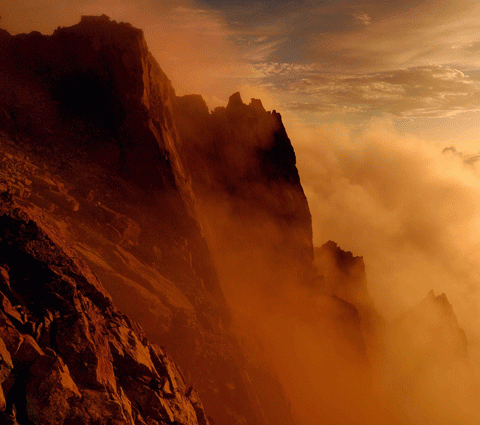On day two of our trek, we spent the night at Shipton’s camp. It is located just below Mount Kenya’s main peaks and nestled amongst towering rocks and giant groundsels. The camp provides a spectacular view of the north faces of Nelion and Batian. We woke up at 2:30 a.m. on day three, ready to embark on the dawn attack. The terrain covering the six kilometres steep ascent to the summit, previously covered by glaciers and now only by scree, is gruesome. The margin of safety on the steep slope, at an altitude of over 15,000 feet, was too small. One can easily skid and land on the ridge or one of the tarns below, and there are about 28 of them in the mountain.
Our single-file ascent to the summit was slow. We talked less, our breathing got heavier, and we sipped water more often. The grinding need to concentrate every single minute was nerve wrenching. The bitingly cold air penetrated right through the layers of my gear and gloves, and my attempts to look down from where we had come sent shivers down my spine – a single mistake would certainly be fatal. I wondered rather somberly how long we could keep it up.
As the air got thinner, we made more stops, and it became increasingly difficult every time we started trekking again. And then the unthinkable happened. I ran out of water about one kilometer to the summit. I knew all along that I must not run out of water. At higher altitudes, the rate of water vapor loss from the lungs is high and leads to dehydration. Dehydration contributes to the symptoms of high-altitude sickness, and depending on one’s susceptibility, it can be severe.
So, dry, almost breathless and now unable to take another step forward, I called for water, but no one had spare water to give. I called out again. Nothing. “Don’t they care?” I hauled myself to the ground and lay prostrate, my body feeling replete of energy, and then, I drifted momentarily.
“Are you okay, David?” Waswa asked.
“I am drained,” I answered, faintly, but as unemotionally as I could.
He looked at me imploringly, and we stared at each other. He then said to the team, “lets move on guys.” From then on, he controlled the pace to match the pace of the slowest person, who happened to be me!
At that point, I recalled Waswa’s words said to me during the preparation period, “It gets to the point where it is sheer willpower that will drive you… mind over body.” I now fully understood what he meant. It was a straight battle between my body that was ready to give up and my mind that set its sights on the goal – Point Lenana. I thought of my wife, son and daughter who had been cheering me on and were waiting to hear heroic stories of my conquests; of my colleagues and friends who all believed I could do it; of my climbing companions with whom we had developed such strong camaraderie.
I weighed my options. I knew deep down that I had no choice but to scale the remaining height, whatever it would take. Irritated that I could even contemplate giving up, I mustered all the mental strength I could, told myself that I was going to make it, and then struggled back on my feet. Fixing my eyes steadfastly on the summit, which was now not far off, I started to trudge on. If I was going to die, I decided, I would have to die on my feet, trying.
Copyright ©2014 David Waweru





